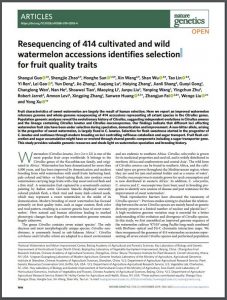Watermelon has been domesticated for more than 4000 years and modern sweet watermelons have been selected to carry large fruits with crisp, non-bitter and sweet flesh. The CucCAP team has co-led an international effort to generate an improved watermelon ‘97103’ reference genome and resequence 414 accessions from the seven extant Citrullus species. The resulting high-resolution genome variation map was used to infer species evolutionary relationships and to identify genome regions with signatures of selection during watermelon speciation, domestication and improvement. These regions include those overlapping with QTLs that underlie improved horticulture traits, such as fruit size enlargement, non-bitterness, increased sweetness and flesh coloration. The improved watermelon reference genome with high contiguity and the genome variation map from this study provide valuable resources to facilitate watermelon breeding and research. View the Boyce Thompson Institute press release regarding this study.
View the 2019 article: Guo et al. Resequencing of 414 cultivated and wild watermelon accessions identifies selection for fruit quality traits. Nature Genetics 51:1616-1623
This article was also shared by EurekAlert | AAAS, FRESHFRUITPORTAL.COM, and LabManager.com

